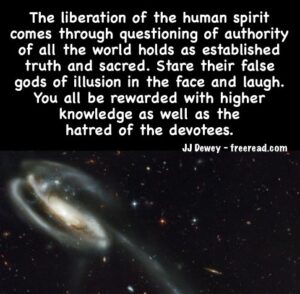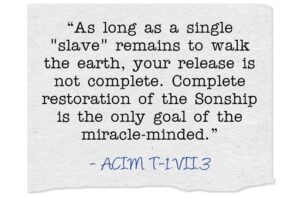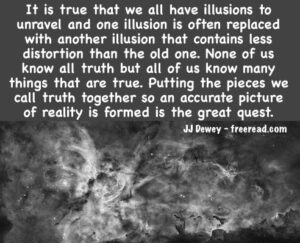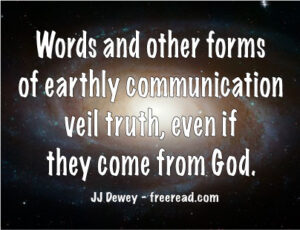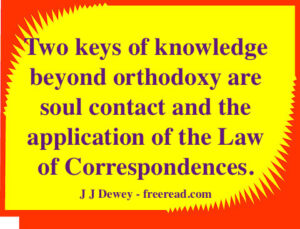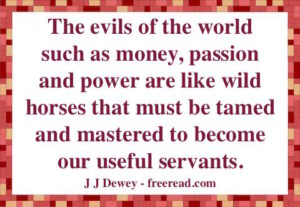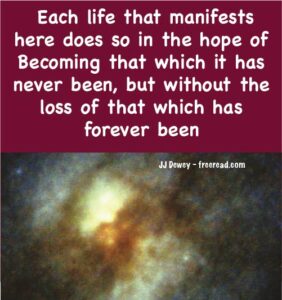
Contrasting Teachings
Another reader made several comments that project illusion about me that needs to be clarified.
First, he seems alarmed that I do not agree with Tolle on all points. He said I should be supporting him.
Well, I do support him in the areas where we agree and I seek to reveal the truth in areas where he projects illusion. Are you telling me that I should actively support that which I see as illusion? That makes no sense at all.
You state that you disagree with me on several items. Do you follow your own advice and support me in areas where you think I am dead wrong? I wouldn’t want or expect you to yet you seem to think I should do this.
I support Eckhart in the general idea that he is getting metaphysical thought out there in the public consciousness. That is a good thing and it will make people think that even though he discourages thinking and using the mind.
As far as pointing out areas where I have a different take or view, I see this as a very positive thing. Light is revealed through contrasts and if my view contrasts with his then light will be seen and steps toward higher vision is taken whether it be me or Tolle who is closer to the light.
Secondly, you seem to think that I feel obligated to disagree with any teacher I meet for the sake of my own ego. You seem to think that I think that I must be more right than the other guy.
I do not think this way at all. Believe me when my good friend started extolling Eckhart Tolle the last thing I wanted was to disagree to the point of conflict.
But I believe in honesty, and if I see what I consider illusion I am not going to be deceptive and pretend like I approve of a message when I do not.
He has asked me to read some more of Tolle’s books and for friendship’s sake I am reading my second one called “The Power of Now.”
The more I read the more I am amazed that some say we are teaching the same things. There is some overlap but in some areas, we are teaching very different things. I find something I disagree with on almost every page but there are still good truths to be found in his books and I have no problem with anyone who thinks that Tolle speaks to them. You can’t please everyone and even if you have the truth you can’t reach everyone. I enjoy an atmosphere where thought and feeling flows freely without censorship.
Allow me to address the idea that Eckhart Tolle and I are teaching the same thing but indifferent words. This is true of a small portion of our teachings, but it is not true in many instances — particularly the foundation teachings.
The first major difference to note is the audience we are reaching out to which is two entirely different types of people.
When he had his spiritual experience that changed his direction he was near the point of suicide, in great emotional pain and saw no meaning in life. After he entered into his bliss this turned around for him and in turn as a teacher he seems to be reaching out to others who are depressed as he once was. I don’t know how many times as I plod through his writings that I get the assumption from him that I, as a reader am supposed to be depressed, angry, in emotional pain, fed up, discouraged, etc.
Since none of this applies to my state of mind. I find this assumption somewhat irritating. Even so, there are many people out the who are hurting as he says. And he is right that a lot of the problem has to do with people identifying too strongly with that which is not real. For people in this state of mind his writings will be of more value than mine for my writings do not deal directly with such problems. Many others like Tony Robbins, Norman Vincent Peale, Dale Carnegie, Deepak Chopra; and, now Eckhart Tolle are giving out some good advice to shift one’s attention off the depressed self to the peaceful and more real self.
I have said many times that my mission is not to repeat what has already been before and is already readily available. For instance, I do not teach regular mediation techniques for there are already many books and teachers on the subject.
Whereas the purpose of Tolle’s writings seem to be to assist those who are mired down in negative thinking, mine are not for that purpose at all.
While I am sure many of my readers have their personal demons, I pretty much leave the handling of the demons up to themselves and their own souls and seek to speak to their souls as well as putting a call forth that will speak from soul to soul. I seek those who are seeking and desire to move into greater light and knowledge by tapping into the intuitive plane which reveals the world of principles. If you experience bliss in the process that is merely a side benefit.
Secondly, he emphasizes “Being” and I emphasize “Becoming.” He emphasizes the present moment and I emphasize the balance of the trinity of past, present and future. These are two major points of foundation teachings and they are very different from each other. Being runs through all of Tolle’s teachings and Becoming runs through all of mine though I do recognize the place that Being has for us.
Tolle’s spiritual experience took him to a state of being that seemed to be his salvation so he now views this state as an all-important thing that we must attain or suffer. He seems to see Becoming as a waste of time working within the illusion.
Let is look at it this way. Let us compare a dreamless sleep state to Being and the awake state to Becoming. Should the goal be to sleep all the time? Of course not. Even though the temptation is there because sleeping requires no effort, is refreshing and if we sleep well it seems at times that it would be nice to sleep forever. The reality is that we can only exist temporarily in the being of sleep and sooner or later we have to get up and do something or enter into the state of Becoming.
How much do you need to know in order to fall asleep? All you have to do is let go of the mind and thought and there you go. This is basically what Tolle tells us to do to enter his state of being which he calls “waking up.” But interestingly it more closely corresponds to going to sleep than waking up.
The real instructions that are needed is what to do when you are awake. Wakefulness into the world of true Becoming is where the real interesting things are happening — for no matter how blissful and peaceful the sleep the world of Becoming is where the action and excitement is.
Now Tolle tells us that this world of Being is eternal and unchanging and this state is not touched or influenced by the world of Becoming which comes and goes and ends as if it never was.
BUT….
Let us look at the correspondence here. Is the quality of our sleep affected by what happens to us during the day or work? Indeed it is. If we suffer guilt, anger or worry this does carry into sleep and affects our quality of being.
The Bible says “the sleep of the laborer is sweet.” I’ve thought of this often during times when I had to do hard physical labor. After a difficult day at hard labor I indeed noticed that my sleep is very sweet. Just as our labor, thoughts and beliefs during the day affect the quality of our sleep at night even so does our plunging into the world of Becoming affect the quality of our being during periods of stillness and of course after death when a more natural state of being is entered into.
The third major difference is Tolle seems to join with the “born-againers” in embracing the “I found it!” concept. He seems to think that this state he has found is “It” with a capital “I,” and once it is attained he has eternal salvation and there is no more Becoming to be had, but only eternal being in the eternal present. Since evolution is illusion then there is really nowhere to go after this attainment.
The only trouble is that even Tolle admits that once he attained the bliss that after a period of time it seemed normal and did not have the intensity at the last as at first. He tells us that no matter how great the bliss that the time will come that we will want more or have it enhanced so this takes us back to The Principle of Becoming.
Did the Principle of Creation itself ever have a beginning? It is true that the creation of any one form has a beginning and an end, but I submit that creation itself is an eternal principle and creation accompanied by Becoming will never end. Then its opposite, Being also will always manifest. But you cannot Be unless you’ve already Become something. That which you seek to Be will have a beginning and an end, but after the end there is a new beginning, worlds without end.
“We don’t see things as they are, we see them as we are.” — Anais Nin (1903 – 1977)
March 18, 2008
To search the website, containing millions of words, replace the word “search” with the word or phrase you want to find and place the entire line in the Google search box.
“Search” site:freeread.com
Easy Access to All the Writings
For Free Book go HERE and other books HERE
JJ’s Amazon page HERE
Check out JJ’s Facebook Group HERE
Follow JJ on Twitter @JosephJDewey HERE
Check out JJ’s videos on TikTok HERE
